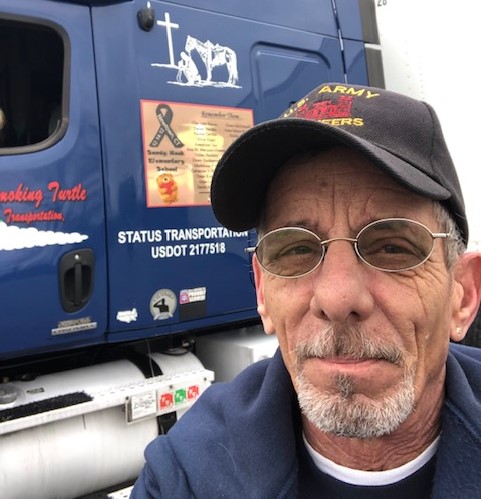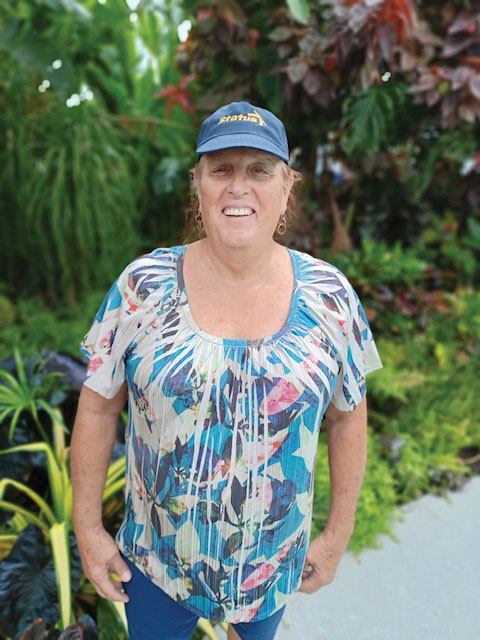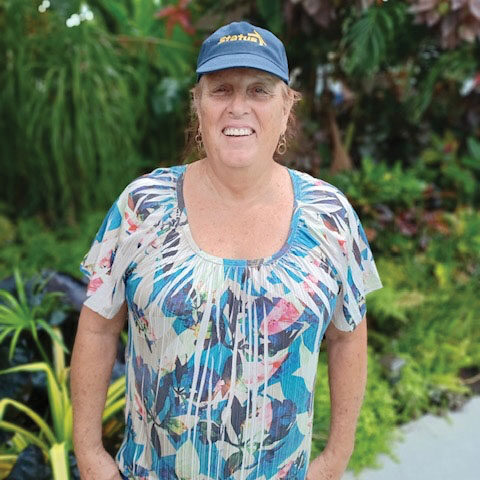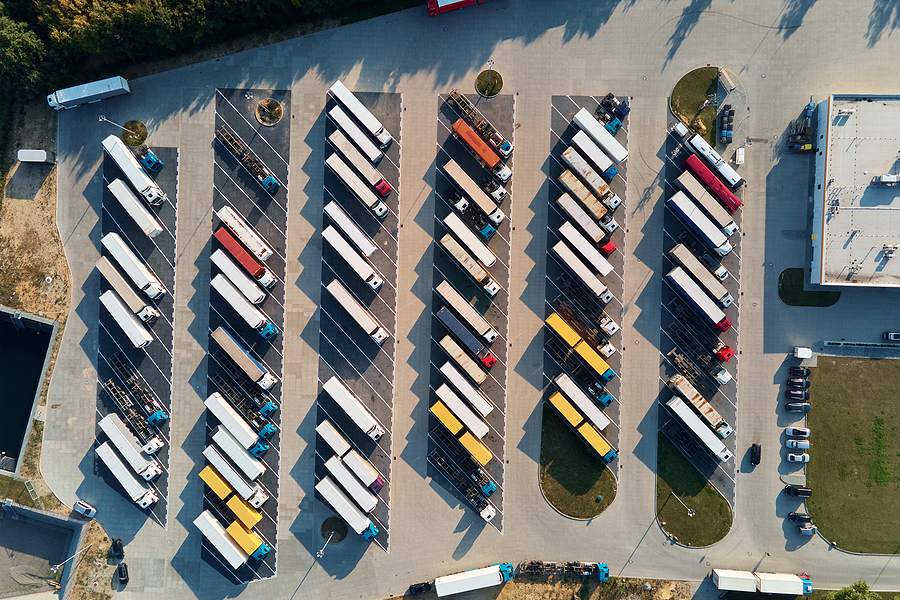
Owner Operator Stories: William Larabee
June 10, 2021
Oscar Lindelof – Owner Operator Interview
August 5, 2021Jamie Acree is a proud Owner Operator working with Status Transportation since 2017. Every one of our Owner Operators has a personal story about starting a trucking career. We continue to share these stories and today we are showcasing Ms. Jamie Acree, who set her sights on how to make money in trucking—and she is excelling at the job. Read on to learn more about what it takes to make it in this important industry where new chapters are written every day in America’s highways.
ST: What made you decide to come to the trucking industry?
Jamie: Well, I grew up in the trucking industry, since my dad was a driver. Before I became a driver I was in the military. I was there for 12 years and in the mid 80s the military started doing cutbacks. I was one of the unfortunate ones chosen, my time was up, and they weren’t going to let me come back in. I decided I didn’t want to spend 13 more years as a weekend warrior, so I left and went on my way. That’s when I got out and went on to trucking school with a company and began to work on starting a trucking career in 1987.
 ST: Since starting a trucking career, what has kept you in this industry all this time?
ST: Since starting a trucking career, what has kept you in this industry all this time?
Jamie: Well, I wasn’t in it the whole time. And like I said, I started in 1987, then I quit driving for a while and started back up again after a few years off. In 2000, when my dad passed away, I went back down to south Florida and I worked for three years down there with my brother-in-law. I eventually left after he sold the business and went up to Fort Lauderdale. I was working around there doing different jobs and I liked what I was doing. But I always kept my license because I figured one day, I’d probably want to become an Owner Operator, which I did.
ST: What tips can you give a new driver when working with their dispatcher?
Jamie: At least staying out on the road for three weeks is what I would think. If what you want is to figure out how to make money in trucking, stay out three weeks and then go home for four days. Or take a week off, you know, it’s your business and you’re an Owner Operator—it’s your truck! You can stay out for three weeks, go home for a week even and then come back out and do it again.
As far as the dispatchers go, you have to take loads since this is how you make money in trucking. Sometimes you’re not going to get a really good load depending on the area that you’re in. Take it and move to an area that the dispatcher’s trying to get you to, an area that’s paying better. Don’t just wait and keep your fingers crossed and sit in one spot for a day and a half, two days, you know? Cause you’re not making any money if your truck isn’t moving. As an Owner Operator, if your wheels are not moving—you’re not making money.
ST: What is the most important thing that leads to success in this industry?
Jamie: You have to maintain good communication and keep the wheels moving. If I can’t at least run at least a minimum of 500 to 600 miles a day, I don’t feel like I haven’t done anything. I guess the main reason I get a lot done is just the way I run as an Owner Operator. I keep the door shut and the wheels rolling and I don’t spend more time in truck stops than I need to. Also, I don’t care if the load is 44,000 lbs or 2000 lbs. It’s all about what the load pays, of course, but that is how to make money in trucking.
ST: How long did it take for you to be comfortable on the road when you first started?
Jamie: Well, I first started driving a cabover and I was looking out the window with no hood. You look out there and you look down to see the road straight in front of you. It’s like I tell a lot of all these new drivers, the first thing you gotta do as an Owner Operator is you gotta learn what your truck is able to do. You have to know how it turns and what the length of it is, you gotta get used to that extra link. You’re not driving a car any more, you know? So, you gotta realize how it turns and how to become part of the truck and the truck’s gotta become part of you.
ST: How did you decide to buy your own truck and become an Owner Operator?
Jamie: Well, I started back with CRST and they didn’t really, I guess, think of me as an “experienced” driver. They wanted me to run a team with somebody and I didn’t like front-end teams to begin with. And they weren’t paying well either. The rate was 25 cents a mile and with a team they should be able to get you 6,000 miles a week, but they couldn’t seem to give us more than 3000 miles a week—and that is not how to make money in trucking. I kept asking them that question, how come we can’t get any miles? There’s two of us in here you’re running and then we have to split that is 3,000 miles between the two of us? No one makes money running 1500 miles a week at 25 cents a mile. So, I was done with them. I looked at Trans-Am and got on their lease to purchase program. This got me thinking about starting a trucking career as an Owner Operator and that is how I bought my current truck. It’s been quite a journey too!
I worked with them for a while and then got laid off. They didn’t tell me before I got to the office what was going on. I just took the truck in, put it in the shop. Then they just took all of their equipment out of the truck and that was it. So, I jumped back in, slapped a piece of paper on the windshield and started trying to figure out what to do next. I was calling around, looking at going to work for Landstar. Trans-Am stopped that phone call really quickly because they wouldn’t give Landstar the information they were asking for. But it turned out for the best, because I went online to look for companies to work as an Owner Operator and that’s when I discovered Status! They seemed to be a reputable trucking company, so I signed on.
ST: How long have you been with Status?
Jamie: Since November of 2017, so it will soon be four years as an Owner Operator!
ST: What would you say is the most challenging part of being a truck driver?
Jamie: The hardest thing out here is trying to predict how people drive. They think you’re a mind reader, because they just fly by you. I understand that they don’t want to be driving behind a truck, maybe because the truck is slower. So, you could be driving in your lane at a steady speed and then next thing you know, they’re cutting right in front of your truck, trying to get to the exit. Then all of a sudden, they’re hitting their brakes and slowing down in front of you, they’re just unpredictable. But you have to stay in your own lane and be alert. And I hate to say it, but there are some truck drivers that do the same. I know what my limits are and I don’t push that limit because if it comes to the point that I start pushing it, no one will ever pay me enough out here to kill myself over a load.
ST: What advice would you give to someone who wants to become an Owner Operator for the first time?
Jamie: Expect to be away from home if you’re starting a trucking career. If you’re going to be an Owner Operator, and you want to make any type of money, you can’t just stay out for three or four days and then go home for a week. You can’t expect to make money in trucking if you’re driving that way. If you’re going to go out on the road, when you’re starting out you have to stay out at least a minimum of four weeks before you decide you want to go home. If you want to be an Owner Operator and you have family and kids that are home and you want to see them and maybe catch sports games on the weekends, whatever it is, just know you’re getting into the wrong business. Because if you want to get into this business, you’re going to have to run often to be a successful Owner Operator. And it’s not the life for a young family. So it is stressful for you, particularly when starting a trucking career.
ST: Any tips or tricks that new drivers should know?
Jamie: As an Owner Operator, you just have to learn how your truck works, that’s all. Learn how it operates and how it works. You’ve got almost 80 feet between the front of the truck to the back. You got to know how it can swing, you gotta become part of it. It’s a learning process, you know? You have to learn to plan your trip when you get a load. Don’t just jump into the truck and go without knowing where you’re headed or when to stop. You have to get an idea of how your next day or few days will look like and plan your trip. You need to know how much time you have, the route you’re taking, what kind of places you can find for the night. Plan as much as you can.
ST: What advice would you give to someone purchasing their first truck?
Jamie: It’s not an easy process unless you have money. To go and buy a truck and make payments, that’s just the beginning of it. You better have money in your pocket to cover anything that might pop up. Don’t go expecting everything to always be smooth sailing. Because the trucks are like us, like people, you know? You never know when you’re going to get sick or when you might fall and break your leg or arm. Even when your truck is parked, over time things are eventually going to break down. They’re machines and they can’t run forever as neither can we. That’s why you need to always take care of yourself and likewise of your truck.
ST: How do you handle breakdowns out on the road?
Jamie: Very carefully. I try not to get to a point where I can break down. You can always prevent breakdowns if you’re doing the proper inspections and looking after your truck.
ST: How long do you stay out on the road at a time?
Jamie: About three to four weeks at a time, maybe a week home? I like to keep the wheels always moving.
ST: What regions do you run and why?
Jamie: If you call the whole United States a region, then I guess that’s what I run. The only stipulations I gave to my dispatcher is that I don’t go to California because of their regulations and I love to keep the ground under my truck. I don’t like going up to the Northeast either, it takes a lot of nerves. I’ll really only run there if the money is good.
ST: What is the average of miles under your belt at this point?
Jamie: If we’re talking about my entire career since starting a trucking career, I’d say close to three million miles.
ST: Are you planning to buy additional trucks and become a fleet owner in the near future?
Jamie: At this point in time? No, I could probably get the funds to get another truck. I don’t see any problem in that part of it. It’s just trying to find dependable drivers, someone I trust, you know? That’s the problematic part.
ST: Are there any situations while being in the trucking industry that have made you wiser or better as an owner operator?
Jamie: I pick up knowledge out here and I try to keep that knowledge. Every day that I’m on the road I try to learn a little bit more. I have learned that when you’re driving, you have to keep yourself inside of your comfort zone, because once you push yourself out of that comfort zone, you’re putting yourself into situations that you’re not ready for, or you’re not expecting. So, stay within your comfort zone, but always keep in mind that everybody’s comfort zone is different. I have also learned that it is important to enjoy what you’re doing. And like I tell my dispatchers, when I get to the point that I won’t enjoy what I do out here anymore, then I’ll sell this truck and trailer and go home. So, I guess, that means that when the time comes, I’ll simply retire. But I’m expecting to be out here for at least another ten years.





